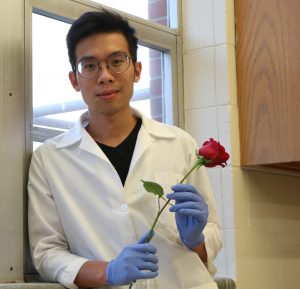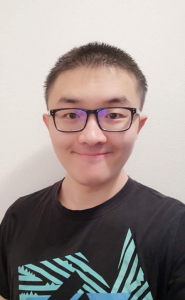Recent graduate Andrew Martin and Ph.D. candidate Yifan Li, both with Iowa State University‘s Department of Materials Science and Engineering (MSE), have received awards for their work: The Iowa State Graduate College Research Excellence Award and Teaching Excellence Award, respectively.
The research award recognizes graduate students for outstanding research accomplishments as documented in their theses and dissertations, while the teaching award recognizes and encourages outstanding achievements made by graduate students in teaching. These students are expected to be academically superior and to develop a well written product based on their work. The intent of these awards is to recognize the “best of the best” of graduate students.

Andrew Martin
Martin, who received the Research Excellence Award, is a member of MSE Associate Professor Martin Thuo’s Soft Materials and Matter Transport Research Group (SMMT). Martin joined the group in fall 2016, and his research focuses on smart manufacturing and processing techniques with neoteric metastable materials. He recently graduated with his Ph.D. from Iowa State and will begin his postdoctoral work at ISU in January 2021.
“My research revolves around utilizing the fundamental part of a material (that is the surface) to tune the bulk material’s behavior as a whole,” Martin said. “The surface may seem obvious to everyone, but not many choose to specifically play around with it, because it can be rather challenging due to its scale. By tuning the surface, however, you can get many interesting behaviors ranging from self-assembly, directed mass transport, manipulation of phase transformation and bandgap, amongst others.”
Regarding the importance of Martin’s research, Thuo said, “His work was centered on understanding how we can melt metals and trap them as liquids even at room temperature. He then demonstrated utility of his findings by printing metallic circuits on non-traditional surfaces like plants, Jell-O, brain tissue, among others. In collaboration with others in the lab, this work has been extended to new approaches of replicating structures from nature (soft-lithography) with metals. Andrew’s graduate work is the beginning of what is likely to be a multi-year effort in processing metals and answering some of science’s unanswered questions or unexplored material space.”
Martin said he feels honored to be recognized by the department and to receive this award, and that he would like to thank Thuo along with current and past SMMT group members for the support throughout his studies.
“There are a lot of undiscovered opportunities within the surface layers and a lot of potentials that it can do. I hope that from my works, people can take it and go in a million different directions,” he said.
According to Thuo, Martin is very deserving of this award and has excelled throughout his time at Iowa State.
“This recognition highlights Andrew’s effort during graduate school, but this is an effort that he started as a junior, and he has kept with it through his thesis. This is a testimony to perseverance, dedication and working smart (not working hard),” Thuo said. “In a space that is highly competitive, and with so many qualified students from the department and college, it takes extra effort to be accorded the research excellence award. I hope this encourages other students to be dedicated and persistent, as Andrew has been. Andrew is the fourth student from my group to receive this award but is the only one to have had his work featured on six journal covers — an unbelievable achievement for a graduate student. I am looking forward to seeing where his career takes him after this.”

Yifan Li
Li, who received the Teaching Excellence Award, is a member of MSE Assistant Professor Shan Jiang’s Soft Matter and Nano Engineering Laboratory. He was recognized for his assistantship, contributions and commitment to teaching efforts as the teaching assistant for the student lab in Mat E 453/553 Physical and Mechanical Properties of Polymers.
“I feel the most important part of my work is trying to help the undergraduates gain a deeper understanding of the fundamental mechanisms behind the straightforward phenomenon — how to transfer the knowledge from the slides and textbooks into the real experiment,” Li said. “My work is more impactful during the lab session, where I can apply my firsthand research experiences as a graduate student to the undergraduate students and help them streamline their experimental design. Last but not least, [I enjoy] sharing my enthusiasm about scientific research, conducting polymeric reactions with the students and helping them to explore the fascinating world of soft matter and build up their enthusiasm to be a future engineer in materials science.”
This year brought more challenges than other years, as students, faculty and staff learned to adapt to online and hybrid learning.
“Due to the impact of COVID-19 this year, the class needed to reduce its size while still keeping social distancing, so I was asked to prepare and record videos demonstrating all of the lab experiments,” Li said. “This online tool allowed the students to get familiar with the procedure before they went to the lab. To ensure a high quality, I designed each scene and prepared scripts accordingly before the recording. During the taping session, I did many takes and repeated the same procedure multiple times from different angles, so that the students could get a better look and understanding. The videos turned out very well, and students got tremendous benefit from them.”
Jiang repeated the importance of Li’s help in the past year, given the challenges of the ongoing pandemic. He stressed that the global pandemic put a lot of strain on teaching capability, especially for labs.
“Yifan went above and beyond helping with the undergraduate labs,” Jiang said. “He helped prepare all the labs and did the demonstration. He is instrumental in organizing experiments, assembling learning materials and demonstrating lab skills. To shoot these lab videos, students had to work together, maintaining safety measures while accomplishing these tasks. Without their effort and help, I would not be able to deliver my lectures effectively. For that, I am thankful, and I deeply appreciate the help.”
In turn, Li was grateful to Jiang and others.
“I would like to thank my advisor, Professor Jiang, for the tremendous guidance and support of my study and life here at Iowa State. Also, the kind help from MSE Programs Manager Michelle Grawe and MSE Teaching Laboratory Specialist Ryan Braga for preparing and maintaining the student lab. Many thanks to Ayuna, Lydia, Ben and Livio for their support with the lab filming,” Li said. “I am extremely happy and honored to receive this prestigious award. Along with the teaching experiences and communication skills I have gained over the past two years, this will definitely benefit my future career from many perspectives.”